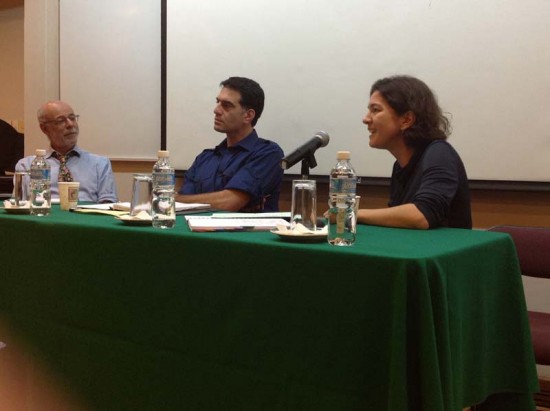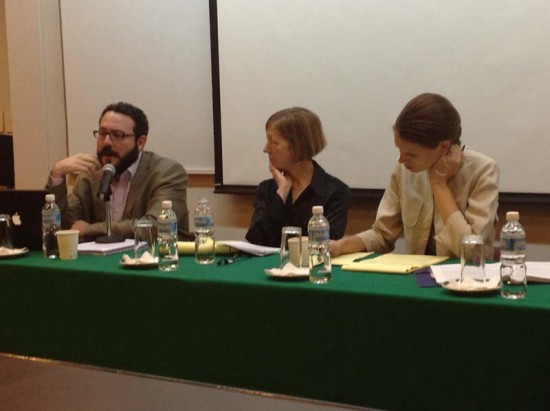The academic ties between the University of Texas School of Law and the Instituto Tecnológico Autónomo de México (ITAM), which began with the establishment of a dual-degree program in 2011, are growing stronger. On October 19–20, 2012, a group of professors from the Law School traveled south to Mexico City, Mexico, to participate in a scholarly symposium with their ITAM colleagues.
The two-day workshop featured three pairs of papers—one each from a UT Law professor and an ITAM professor—from the same general areas: law and economics, law and society, and the rule of law. In an unusual twist, papers were presented by a member of the other school’s faculty, who then provided comments and criticisms. The paper’s author then had an opportunity to respond, which was followed by a group discussion.

Professors William Forbath and Oren Bracha of UT Law, and Professor Francisca María Pou Giménez of ITAM.
William Forbath, associate dean for research and the Lloyd M. Bentsen Chair in Law, worked with Pablo Larrañaga of ITAM to coordinate the symposium. Other participants from the Law School included Ronen Avraham, Mitch Berman, Oren Bracha, Karen Engle, John Golden, Jennifer Laurin, Larry Sager, and James Spindler.
“The workshop was interesting and useful for both sides,” Forbath said. “All the papers presented were good, provocative work, and were followed by sustained and lively discussion about the subjects at hand. There was also surprising common ground. Our Mexican colleagues had many sharp, useful criticisms and suggestions about the American papers, and vice versa.”
ITAM has one of the premier law programs in Mexico, and many of the faculty members have studied abroad in the United States and elsewhere. Their fluency in English helped the proceedings flow smoothly, with little lost in translation, for which the Americans were grateful.
“One area that I found particularly exciting related to the Mexican Supreme Court, which has embarked on an effort to remake itself into a constitutional court similar to other constitutional courts in Latin America and theUnited States,” Forbath said. “Several of the ITAM professors are deeply involved in that experiment.”
This symposium marks another step in the relationship between the Law School and ITAM, and builds on the innovative dual-degree program established in 2011. Students in the dual-degree program will spend significant time at each institution before graduating. The degrees granted by each institution are complete and comprehensive, so students are academically eligible to practice law in both theU.S.and Mexican legal systems and can pursue any area of legal specialization they wish after graduation.
Professor Jennifer Laurin was one of the attendees from Austin with a paper at the symposium. “I was excited to learn about the dual degree program the law school had set up with ITAM, and hoped it might translate into more opportunities for scholarly engagement with our colleagues across the border,” Laurin said. “So when I heard about this opportunity, I was very enthusiastic. And the symposium was really terrific.”
Laurin’s paper, “Remapping the Path Forward: Toward a Systemic View of Forensic Science Reform and Oversight,” was presented by Jorge Cerdio, dean of ITAM.
“It was incredibly valuable to get feedback from colleagues reading my paper from a very different context,” Laurin said. “Mexicois going through a very significant transition in their legal system, so they are working through many of these issues. The ITAM participants were very interested in my paper because it raises issues in forensic science that are on the frontier of their justice system.”

Jorge Cerdio, dean of the Instituto Tecnológico Autónomo de México, and Professors Karen Engle and Jennifer Laurin of the University of Texas School of Law.
Karen Engle, the Minerva House Drysdale Regents Chair in Law and founder and codirector of the Bernard and Audre Rapoport Center for Human Rights and Justice, has spent time in Mexico and regularly engages with academics in the country. She believes that the relationship with ITAM will enhance the existing ties between the University of Texas and Mexico.
“I learned a great deal from the conference proceedings, and also found it enriching to meet and engage with the relatively large number of faculty at ITAM who work in the fields of international human rights and comparative constitutional law,” Engle said. “I look forward to what this collaboration will bring to the Rapoport Center for Human Rights and Justice and Latin American Studies at the university.”
Current plans call for the Law School to host professors from ITAM next fall for a follow-up symposium here in Austin.
